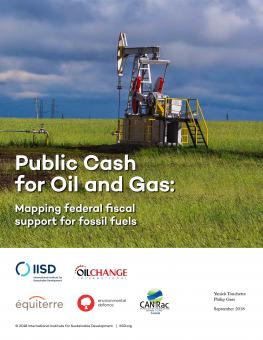
Public Cash for Oil and Gas: Mapping federal fiscal support for fossil fuels
This report examines the inventory of federal fossil fuel subsidies in Canada
This report maps and updates IISD's inventory of federal fossil fuel subsidies in Canada.
The top-line message of the report is that subsidies that were quantified are down substantially from IISD's last report due to a combination of three dynamics:
- Reform of fossil fuel subsidies through government policy changes since the last inventory
- A decline in global oil prices since the last inventory, which resulted in less exploration/production
- Companies deferring some tax benefits that could be taken in the future
Participating experts
Additional downloads
Funded by
You might also be interested in
How Fossil Fuels Drive Inflation and Make Life Less Affordable for Canadians
New report takes closer look at how Canada’s dependence on fossil fuels impacts energy costs and prices of essentials such as transportation, home heating, and housing.
IISD Applauds Canada’s Reaffirmation to End Domestic Public Finance for Fossil Fuels in Budget 2024
Today's federal budget announcement delivers new measures to support affordability and reaffirms Canada’s commitments on climate action.
Increased Support Needed to Achieve India's Clean Energy Goals
India is on track to achieve many of its 2030 clean energy goals but needs to step up government support measures to accelerate the deployment of offshore wind, electric vehicles, and green hydrogen, according to a new report.
Ending Export Credits for Oil and Gas: How OECD countries can end 2024 with a climate win
For a year now, Organisation of Petroleum Exporting Countries (OECD) governments have been negotiating an agreement that could put an end to oil and gas export finance. Following the acrimony in Baku, this would be a very real way for the OECD to show policy coherence, respond to calls from the poorest countries to stop subsidizing fossil fuels, and shift public finance to solutions.